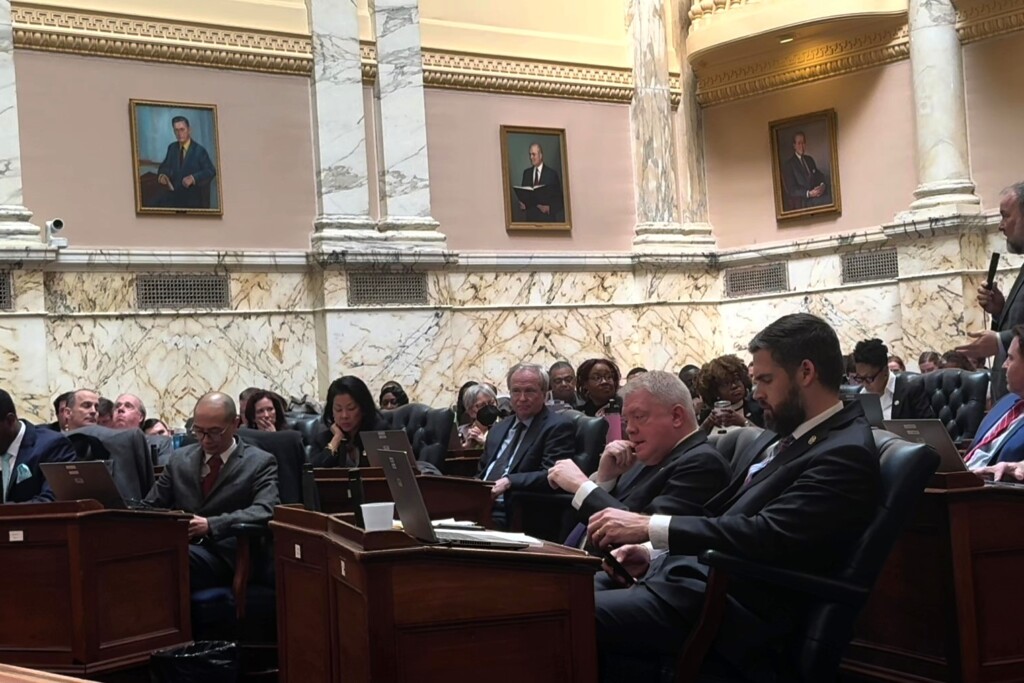Democrats in the House are pressing a nearly $1.2 billion package they say will pay for both a multi-billion expansion of education funding and a multi-billion projected shortfall in the state’s Transportation Trust Fund.
The package highlighted Friday by House Speaker Adrienne A. Jones (D-Baltimore County) and three committee chairs is unlikely to be warmly received in the Senate. Democrats in that chamber, including Senate President Bill Ferguson (D-Baltimore City), continue to reject any call for new gaming or broad tax increases.
Jones and her lieutenants told reporters that the state cannot wait to solve what they described as the state’s urgent fiscal woes.
“For months, the House has been talking about the fiscal realities Maryland is facing,” Jones said. “We are here today to say that we are ready and willing to meet the challenges head on. We can no longer rely on quick fixes for short-term approaches. They will only land us right back in the same place next year. At this point, we know what the solution is. And it’s finally time that we just say the answer is revenues.”
Budget troubles
The legislature opened this year in the shadow of billions of dollars of projected deficits driven by the costs of the education plan known as the Blueprint for Maryland’s Future.
Next year, the deficit is projected to reach $1 billion, according to legislative analysts. In fiscal 2027, the last year of Gov. Wes Moore’s term, it would grow to $1.3 billion. A year later, it would more than double to $3 billion — about 12% of the general fund revenues projected for that year.
Not included in the analysts’ January projection is a separate $3.1 billion gap in the state’s Transportation Trust Fund over the next five years. Moore and Transportation Secretary Paul Wiedefeld warned of draconian cuts to every jurisdiction in the state without increased funding.
The deficit projections are the largest since the Great Recession, those analysts said in January.
House Ways and Means Chair Vanessa Atterbeary (D-Howard) said that without more money, the result would be walking back portions of the Blueprint for Maryland’s Future. That option, she said, was not acceptable.
“As a mother and as legislator, I cannot turn my back on that commitment,” she said. “Neither can Madam Speaker, neither can [House Appropriations] Chair [Ben] Barnes, [House Environment and Transportation] Chair [Marc] Korman and all of my colleagues. This is why the Ways and Means Committee passed combined reporting and iGaming to fund the Blueprint.”
The Senate Budget and Taxation Committee finalized its version of Moore’s proposed $63 billion fiscal 2025 budget earlier this week.
The Senate version relies on balance transfers, about $800 million in one-time cash, and tapping both the state’s rainy day fund as well as an account used to offset volatile capital gains revenues.
Senate Budget and Taxation Chair Guy Guzzone (D-Howard) said the Senate version of the budget ensures the state can pay for education in fiscal 2025 and 2026 and at least part of fiscal 2027.
“We’ve got at least one more year where we have the funding that we need to keep moving forward,” he said. “I appreciate the fact that the House is looking forward. We’re looking forward also. It’s just a matter of timing. That’s all and we’ll have that discussion.”
An ‘unsustainable’ budget narrative
The House, meanwhile, continues its work on the Senate version.
“I want to talk a little bit about a narrative that’s developed that we have a balanced budget and so everything’s fine. There’s not a real problem,” said Barnes. “I think that narrative ignores how the Senate has balanced the budget.”
Barnes said those budget maneuvers are “not sustainable.”
The House plan announced Friday focuses on finding money for both expanded education spending and a transportation fund shortfall.
To that end, the House Ways and Means Committee has approved an iGaming bill and the closure of corporate reporting tax loopholes that are part of the Fair Share Act.
Revenues from both total nearly $500 million. All would be earmarked for the costs of the Blueprint.
It’s not just taxes to which the Senate is opposed. The chamber has also rejected expanding gambling into iGaming — casino-style games on phones, computers and other electronic devices.
Other opponents to gaming expansion include organized labor and House Republicans, an unusual alliance.
Del. Kathy Szeliga (R-Baltimore County) called expanded gaming “a bad bet for Maryland.” She said passage of the bill would cost the state over $100 million from lost jobs and expressed skepticism that more gaming was a balm for the state’s education funding ills.
“How many times have we been promised that these funding sources will solve education, you know, slots for tots,” said Szeliga. “We don’t forget that when gambling was brought to Maryland, we were promised it would solve education funding issues.”
Additionally, the House is proposing a package of tax and fee and toll increases totaling $675 million for transportation projects.
The package is cobbled together from more than a half-dozen bills already introduced.
“I think the speaker has been clear, we’re not going to take a number that doesn’t solve a problem,” said Barnes. “So, we want to solve the problem. If they have a number that we believe solves the problem, we’re all open to it, but we need to solve the problem.”
Without the additional revenues, projects would have to be cut, said Barnes.
The legislature last year established the 31-member Transportation Revenue and Infrastructure Needs Commission. That panel was charged with recommending ways to modernize how the state pays for road and transit projects.
In an interim set of recommendations, the panel called for new registration fees for electric and hybrid vehicles to make up for revenue lost from gas taxes. The panel also recommended increased tolls which could then, in part, be used to backfill the Transportation Trust Fund.
The House and Senate both have bills incorporating those recommendations.
The Senate has preliminarily approved a bill that would increase vehicle registration fees for owners of electric cars and plug-in hybrids.
The average Maryland driver pays $226 annually in gas taxes.
Under the Senate plan, owners of an all-electric vehicle would pay $300 every two years. Gas-electric hybrid owners would pay $245 every two years.
The fees could be paid in installments over time.
The House version calls for a $125 per year for zero-emission vehicles. The two-year registration fee of $250 could be paid in installments.
Heading to conference
House leaders will wrap all the proposals into a budget reconciliation bill. The tactic will force a discussion in a conference committee with senators rather than allowing the Senate to unilaterally dismiss the House proposals.
But the House proposals appear doomed.
Ferguson on Friday reiterated his long-repeated insistence that his chamber has no interest in considering tax hikes this session.
“I don’t think there’s much room for compromise and this is what we’ve been saying for months,” he said during a Friday meeting with reporters. That meeting was held at the same time as the news conference hosted by Jones and her leadership team.
Ferguson said Senate and House leaders share priorities. He also did not rule out the possibility of considering a revenue package next year.
“Just like we do every single year, we’ll adjust and adapt to the circumstances,” he said.
‘The high bar’
Moore, for his part, is attempting to walk a line that neither supports nor opposes taxes. He had repeatedly said any increase would have to meet a high bar. The exact standard has not been defined.
“We are facing shortfalls in our transportation trust fund that are not sustainable. So we believe we’ve met the high bar,” said Barnes. “Second, I think the governor and the Senate share our values, which are the values of the people of the state of Maryland. I think that because we share these values that in the end, we will all come together for real solutions.”
In an appearance on “The Politics Hour” on WAMU Radio Friday, the governor cited concerns about the state’s lagging economy.
“For the past five years, Maryland’s economy has grown by .2%. The average state has grown by 7.5. So, we’ve got to get this economy moving,” Moore said, adding: “There is a way that we can continue growing, be bold, and also know that any conversations around taxes are going to have a very high bar.”
In a statement shortly after the House leaders’ news conference, Carter Elliott IV, a spokesperson for Moore, emphasized the governor’s reluctance to consider tax increases.
“The governor has been clear on this issue since day one — he introduced a budget that included record funding for public education, child care and to our local law enforcement offices all without raising taxes,” Elliott said.
“Any conversation with the General Assembly around taxes is going to have a very high bar for the governor, and any of those conversations will focus on creating fiscally disciplined ways of making Maryland’s economy grow.”
But when asked if Moore felt the House had met the “high bar” standard, the spokesperson referred a reporter back to the last sentence of the statement.
Two weeks ago, following the announcement of a $250 million downward revision of revenue projections, Moore seemed to be leaning in opposition.
“We’re always going to continue really digging into the numbers and digging into the data,” Moore told reporters on March 1. “We’re always going to make the decisions that are going to be both fiscally responsible and also address the moment and I just do not believe right now that raising taxes is something we have to do.”
“I have not seen anything yet in the way that the budget has rolled out that would move me from that position,” he said.
By Bryan P. Sears. Josh Kurtz contributed to this report.










